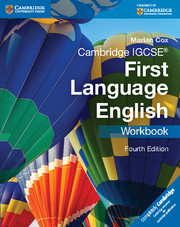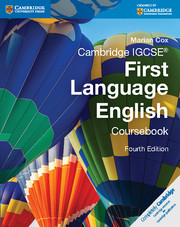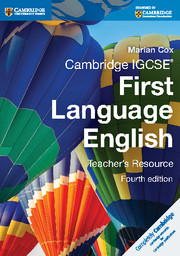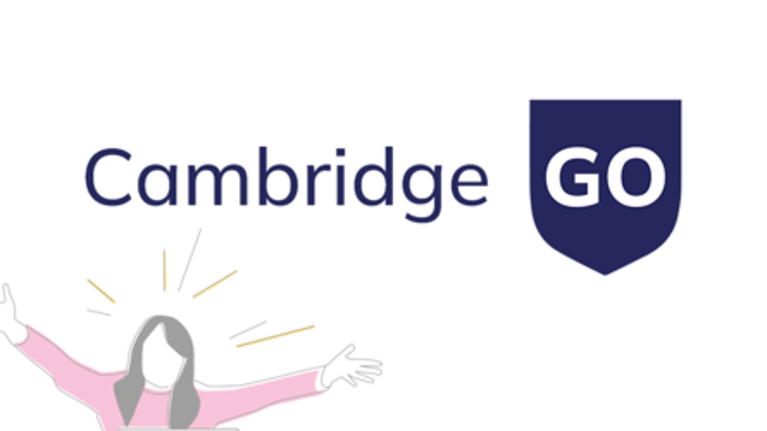Cambridge IGCSE® First Language English Workbook
Overview
This updated, write-in Cambridge IGCSE First Language English Workbook (fourth edition) can be used for independent learning, for homework tasks or revision. It contains text extracts from around the world with linked exercises for students to practise the skills they need for the Cambridge IGCSE. Exercises are grouped into 12 diverse units on cross-curricula topics which are not linked to the Coursebook themes, so students remain engaged in the reading material. The Cambridge IGCSE First Language English Workbook (fourth edition) has been completely updated in line with the new syllabus. It is particularly suitable for students who need additional support with language and grammar. A microsite provides free online resources to support the course.
Features
- This write-in workbook includes exam-type questions for skills practice as well as language exercises on spelling, punctuation, vocabulary or grammar.
- The Workbook has been completely updated in line with the new syllabus, bringing reading texts and content up-to-date and relevant.
- It is totally independent of the Coursebook (although of course the skills it covers are the same) so can be used as a standalone resource or with other components.
- The structure is user-friendly with numbered tasks with space for students to complete the tasks in the book, grouped according to skill such as directed writing, reading comprehension and summary.
Contents
- Introduction
- Unit 1. Rocket science - vocabulary, parts of speech, passive voice, reading an encyclopedia entry, writing a magazine article and a summary
- Unit 2. Bears and apes - vocabulary, parenthesis, writer's effects, reading a story and an article, writing an article, a speech and a summary
- Unit 3. Simply flying - vocabulary, spelling, prefixes, dashes and hyphens, reading an article and a recruitment advertisement, writing a dialogue, a job application letter and a summary
- Unit 4. On the ball - apostrophes, semicolons, vocabulary, spelling, speech punctuation, prefixes, reading articles, writing a dialogue, a persuasive letter and a summary
- Unit 5. Great rivers - parts of speech, commas, sentence structures, fact and opinion, writers' effects, reading articles and an extract, writing a dialogue, a complaint letter and a summary
- Unit 6. Trunk tales - prefixes, vocabulary, synonyms, punctuation, reading an article and a story, writing a news report, a letter/email and a plot summary
- Unit 7. Bricks and stones - vocabulary, synonyms, past tenses, relative clauses, prepositions, sentence punctuation, writer's effects, reading articles, writing a summary, a dialogue, a news report and an informative letter
- Unit 8. Medical records - punctuation, homophones, spelling, writers' effects, reading an article and a news report, writing a summary, an appeal letter, and a journal entry
- Unit 9. In a tight spot - vocabulary, writer's effects, narrative devices, speech punctuation, reading an article and a story, writing a summary, an encyclopedia entry and a diary entry
- Unit 10. Losing sleep - writers' effects, raise/rise/arise, prepositions, conditionals, grammatical structures, reading an article and a story, writing an informative leaflet
- Unit 11. Sub-zero - vocabulary, synonyms, sentence structures, writers' effects, paraphrase, reading an article and journal entries, writing an advertisement, a letter/email and a magazine article
- Unit 12. The miracle of DNA - vocabulary, writers' effects, identifying bias, sentence structure, reading an article and a factsheet, writing a summary and a letter
- Acknowledgements
- Answers.
Brighter Thinking Blog
Keep up to date with the latest classroom tips and educational trends from our brighter thinkers.
Visit the blogCatalogues and Ordering
Looking for something in particular or just browsing? View our catalogues to see our full range of print and digital books.
View and downloadAdvice on useful tools
Advice on useful tools, activities and timetabling from teachers experiencing school closures.
Cambridge GO
All our supporting resources have now moved to Cambridge GO – the new home for your Cambridge digital content.
Listen to our podcast
Listen to our podcast to discover teaching inspiration & advice from leading educational thinkers.






